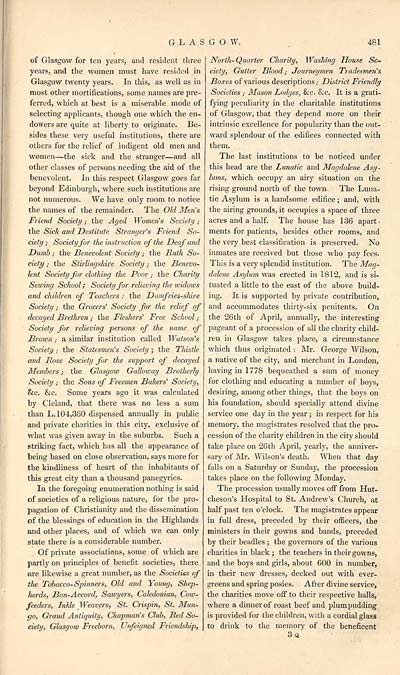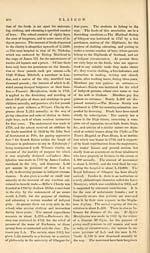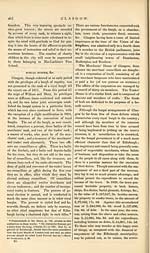Gazetteer of Scotland > Volume 1
(517) Page 481 - GLA
Download files
Complete book:
Individual page:
Thumbnail gallery: Grid view | List view

GLASGOW.
481
of Glasgow for ten years, and resident three
years, and the women must have resided in
Glasgow twenty years. In this, as well as in
most other mortifications, some names are pre-
ferred, which at best is a miserable mode of
selecting applicants, though one which the en-
dowers are quite at liberty to originate. Be-
sides these very useful institutions, there are
others for the relief of indigent old men and
women — the sick and the stranger — and all
other classes of persons needing the aid of the
benevolent. In this respect Glasgow goes far
beyond Edinburgh, where such institutions are
not numerous. We have only room to notice
the names of the remainder. The Old Men's
Friend Society ,■ the Aged Women's Society ;
the Sick and Destitute Stranger's Friend So-
ciety ; Society for the instruction of the Deaf and
Dumb ; the Benevolent Society ; the Ruth So-
ciety ; the Stirlingshire Society ,■ the Benevo-
lent Society for clothing the Poor ,■ the Charity
Sewing School; Society for relieving the widows
and children of Teachers : the Dumfries-shire
Society ; the Grocers' Society for the relief of
decayed Brethren ; the Fleshers' Free School ;
Society for relieving persons of the name of
Brown ; a similar institution called Watson's
Society ; the Statesmen's Society ; the Thistle
and Rose Society for the support of decayed
Members ; the Glasgow Galloway Brotherly
Society ; the Sons of Freemen Bakers' Society,
&c. &c. Some years ago it was calculated
by CI eland, that there was no less a sum
than L. 104,360 dispensed annually in public
and private charities in this city, exclusive of
what was given away in the suburbs. Such a
striking fact, which has all the appearance of
being based on close observation, says more for
the kindliness of heart of the inhabitants of
this great city than a thousand panegyrics.
In the foregoing enumeration nothing is said
of societies of a religious nature, for the pro-
pagation of Christianity and the dissemination
of the blessings of education in the Highlands
and other places, and of which we can only
state there is a considerable number.
Of private associations, some of which are
partly on principles of benefit societies, there
are likewise a great number, as the Societies of
the Tobacco- Spinners, Old and Young, Shep-
herds, Bon-Accord, Sawyers, Caledonian, Cow-
feeders, Inkle Weavers, St. Crispin, St. Mun-
go, Grand Antiquity, Chapman's Club, Red So-
ciety, Glasgow Freeborn, Unfeigned Friendship,
North- Quarter Charity, Washing House So-
ciety, Gutter Blood; Journeymen Tradesmen's
Boxes of various descriptions; District Friendly
Societies ; Mason Lodges, &c. &c. It is a grati-
fying peculiarity in the charitable institutions
of Glasgow, that they depend more on their
intrinsic excellence for popularity than the out-
ward splendour of the edifices connected with
them.
The last institutions to be noticed under
this head are the Lunatic and Magdalene Asy-
lums, which occupy an airy situation on the
rising ground north of the town. The Luna-
tic Asylum is a handsome edifice ; and, with
the airing grounds, it occupies a space of three
acres and a half. The house has 136 apart-
ments for patients, besides other rooms, and
the very best classification is preserved. No
inmates are received but those who pay fees.
This is a very splendid institution. The Mag-
dalene Asylum was erected in 1812, and is si-
tuated a little to the east of the above build-
ing. It is supported by private contribution,
and accommodates thirty-six penitents. On
the 26th of April, annually, the interesting
pageant of a procession of all the charity child-
ren in Glasgow takes place, a circumstance
which thus originated : Mr. George Wilson,
a native of the city, and merchant in London,
having in 1778 bequeathed a sum of money
for clothing and educating a number of boys,
desiring, among other things, that the boys on
his foundation, should specially attend divine
service one day in the year ■ in respect for his
memory, the magistrates resolved that the pro-
cession of the charity children in the city should
take place on 26th April, yearly, the anniver-
sary of Mr. Wilson's death. When that day
falls on a Saturday or Sunday, the procession
takes place on the following Monday.
The procession usually moves off from Hut-
cheson's Hospital to St. Andrew's Church, at
half past ten o'clock. The magistrates appear
in full dress, preceded by their officers, the
ministers in their gowns and bands, preceded
by their beadles ; the governors of the various
charities in black ; the teachers in their gowns,
and the boys and girls, about 600 in number,
in their new dresses, decked out with ever-
greens and spring posies. After divine service,
the charities move off to their respective halls,
where a dinner of roast beef and plum pudding
is provided for the children, with a cordial glass
to drink to the memory of the beneficent
3a
481
of Glasgow for ten years, and resident three
years, and the women must have resided in
Glasgow twenty years. In this, as well as in
most other mortifications, some names are pre-
ferred, which at best is a miserable mode of
selecting applicants, though one which the en-
dowers are quite at liberty to originate. Be-
sides these very useful institutions, there are
others for the relief of indigent old men and
women — the sick and the stranger — and all
other classes of persons needing the aid of the
benevolent. In this respect Glasgow goes far
beyond Edinburgh, where such institutions are
not numerous. We have only room to notice
the names of the remainder. The Old Men's
Friend Society ,■ the Aged Women's Society ;
the Sick and Destitute Stranger's Friend So-
ciety ; Society for the instruction of the Deaf and
Dumb ; the Benevolent Society ; the Ruth So-
ciety ; the Stirlingshire Society ,■ the Benevo-
lent Society for clothing the Poor ,■ the Charity
Sewing School; Society for relieving the widows
and children of Teachers : the Dumfries-shire
Society ; the Grocers' Society for the relief of
decayed Brethren ; the Fleshers' Free School ;
Society for relieving persons of the name of
Brown ; a similar institution called Watson's
Society ; the Statesmen's Society ; the Thistle
and Rose Society for the support of decayed
Members ; the Glasgow Galloway Brotherly
Society ; the Sons of Freemen Bakers' Society,
&c. &c. Some years ago it was calculated
by CI eland, that there was no less a sum
than L. 104,360 dispensed annually in public
and private charities in this city, exclusive of
what was given away in the suburbs. Such a
striking fact, which has all the appearance of
being based on close observation, says more for
the kindliness of heart of the inhabitants of
this great city than a thousand panegyrics.
In the foregoing enumeration nothing is said
of societies of a religious nature, for the pro-
pagation of Christianity and the dissemination
of the blessings of education in the Highlands
and other places, and of which we can only
state there is a considerable number.
Of private associations, some of which are
partly on principles of benefit societies, there
are likewise a great number, as the Societies of
the Tobacco- Spinners, Old and Young, Shep-
herds, Bon-Accord, Sawyers, Caledonian, Cow-
feeders, Inkle Weavers, St. Crispin, St. Mun-
go, Grand Antiquity, Chapman's Club, Red So-
ciety, Glasgow Freeborn, Unfeigned Friendship,
North- Quarter Charity, Washing House So-
ciety, Gutter Blood; Journeymen Tradesmen's
Boxes of various descriptions; District Friendly
Societies ; Mason Lodges, &c. &c. It is a grati-
fying peculiarity in the charitable institutions
of Glasgow, that they depend more on their
intrinsic excellence for popularity than the out-
ward splendour of the edifices connected with
them.
The last institutions to be noticed under
this head are the Lunatic and Magdalene Asy-
lums, which occupy an airy situation on the
rising ground north of the town. The Luna-
tic Asylum is a handsome edifice ; and, with
the airing grounds, it occupies a space of three
acres and a half. The house has 136 apart-
ments for patients, besides other rooms, and
the very best classification is preserved. No
inmates are received but those who pay fees.
This is a very splendid institution. The Mag-
dalene Asylum was erected in 1812, and is si-
tuated a little to the east of the above build-
ing. It is supported by private contribution,
and accommodates thirty-six penitents. On
the 26th of April, annually, the interesting
pageant of a procession of all the charity child-
ren in Glasgow takes place, a circumstance
which thus originated : Mr. George Wilson,
a native of the city, and merchant in London,
having in 1778 bequeathed a sum of money
for clothing and educating a number of boys,
desiring, among other things, that the boys on
his foundation, should specially attend divine
service one day in the year ■ in respect for his
memory, the magistrates resolved that the pro-
cession of the charity children in the city should
take place on 26th April, yearly, the anniver-
sary of Mr. Wilson's death. When that day
falls on a Saturday or Sunday, the procession
takes place on the following Monday.
The procession usually moves off from Hut-
cheson's Hospital to St. Andrew's Church, at
half past ten o'clock. The magistrates appear
in full dress, preceded by their officers, the
ministers in their gowns and bands, preceded
by their beadles ; the governors of the various
charities in black ; the teachers in their gowns,
and the boys and girls, about 600 in number,
in their new dresses, decked out with ever-
greens and spring posies. After divine service,
the charities move off to their respective halls,
where a dinner of roast beef and plum pudding
is provided for the children, with a cordial glass
to drink to the memory of the beneficent
3a
Set display mode to: Large image | Transcription
Images and transcriptions on this page, including medium image downloads, may be used under the Creative Commons Attribution 4.0 International Licence unless otherwise stated. ![]()
| Gazetteers of Scotland, 1803-1901 > Gazetteer of Scotland > Volume 1 > (517) Page 481 - GLA |
|---|
| Permanent URL | https://digital.nls.uk/97430566 |
|---|
| Description | Volume I: Abbey to Glenartney. |
|---|---|
| Attribution and copyright: |
|
| Description | By Robert Chambers and William Chambers. Glasgow: Blackie & Son, 1838. 2 volumes. |
|---|---|
| Shelfmark | NF.1461.g.7 |
| Additional NLS resources: | |

